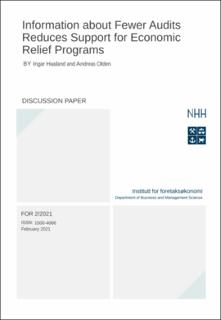Information about Fewer Audits Reduces Support for Economic Relief Programs
| dc.contributor.author | Haaland, Ingar | |
| dc.contributor.author | Olden, Andreas | |
| dc.date.accessioned | 2021-02-05T12:45:01Z | |
| dc.date.available | 2021-02-05T12:45:01Z | |
| dc.date.issued | 2021-02-05 | |
| dc.identifier.issn | 1500-4066 | |
| dc.identifier.uri | https://hdl.handle.net/11250/2726439 | |
| dc.description.abstract | Using a probability-based sample of the Norwegian population, we test whether an informational treatment about fewer audits by the Norwegian Tax Administration during the peak of the COVID-19 crisis affects support for an economic relief program designed to save jobs and prevent bankruptcies. The information treatment significantly reduces support for the economic relief program. The underlying mechanisms are lower trust in the tax administration and more pessimism about its ability to detect misuse of the program. | en_US |
| dc.language.iso | eng | en_US |
| dc.publisher | FOR | en_US |
| dc.relation.ispartofseries | Discussion paper;2/21 | |
| dc.subject | Policy Preferences | en_US |
| dc.subject | Economic Relief Programs | en_US |
| dc.subject | Information | en_US |
| dc.subject | Audit Activities | en_US |
| dc.title | Information about Fewer Audits Reduces Support for Economic Relief Programs | en_US |
| dc.type | Working paper | en_US |
| dc.source.pagenumber | 32 | en_US |
Tilhørende fil(er)
Denne innførselen finnes i følgende samling(er)
-
Discussion papers (FOR) [566]
